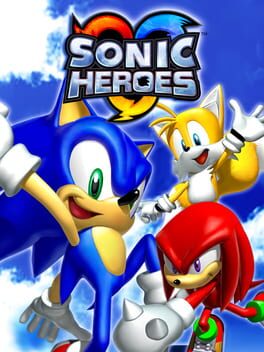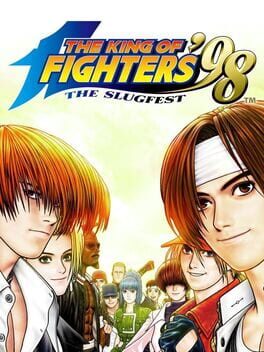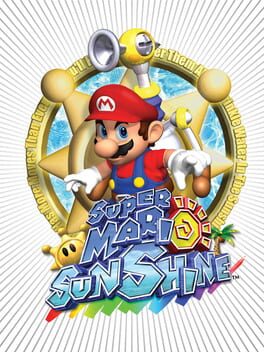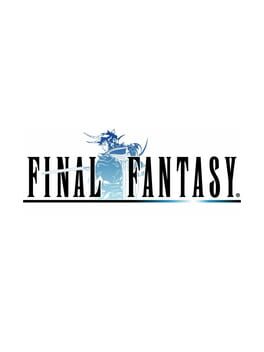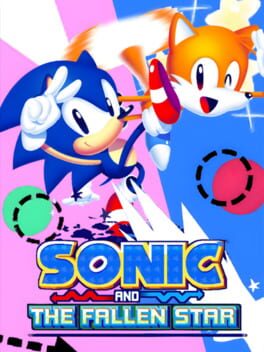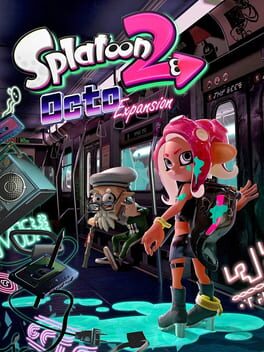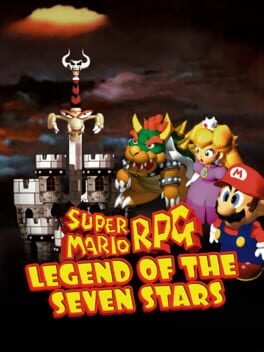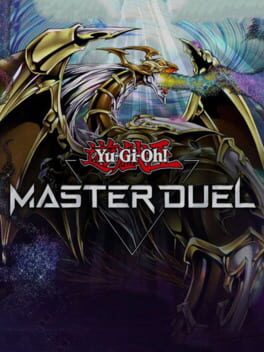Lyoncobalt
55 reviews liked by Lyoncobalt
Sonic Heroes
2003
sonic heroes is one massive paradox; the controls for the characters are terrible and unfun, the level design forces you to engage in a lot of mind numbing combat and you cant even spindash or do anything fun or creative with sonic at all. and yet somehow it still manages to be a (somewhat) fun experience, thanks to having mostly solid level design and some of the best locales in the entire series. uh. ive only played team sonic's story though. should i even be logging this
A game that brings me nothing but pure joy. All the boxes are checked. Insanely loveable cast, sprawling world to explore, stellar voice performances, gut punching story, gorgeous soundtrack, and an option filled combat system. Another entry where I constantly want to know what happens next whilst never wanting the game to end. A euphoric feeling, felt a third time over. A few QoL issues like no reloading in-game, chain attacks taking too long, no leveling down before post-game are but small blemishes.
Super Mario Sunshine
2002
Super Mario Sunshine is so explicitly Summer themed that even its cover exudes powerful waves of Summah energy. From its very premise - which sees Mario and Peach travel to the perpetually sunny Isle Delfino to enjoy a much-deserved vacation - to its world design and water-based gameplay, it is as blatantly Summah as any game could possibly be. Naturally, ending my 2023 Summah Games Series with Super Mario Sunshine seemed like a no-brainer. Seemed like a real good idea at the time.
The Summah is so cancelled, man.
I haven't touched this game since 2002, and to be perfectly honest, I didn't think very highly of it back then. I was extremely excited for it leading up to release though, as I'm sure plenty of people were considering this was the first big follow up to Super Mario 64. It is somewhat hard to factor out my disappointment when viewing it through the frame of being 64's direct sequel, so I'm going to state up front that I'll be making numerous direct comparisons between both games to elucidate why I think Mario Sunshine just does not work mechanically and feels bad to play.
Episode 1: Blob Mario is On The Loose
Super Mario 64 released in 1996 and was one of the first major 3D platformers - this is an almost unnecessary statement of fact, but I need to establish the premise that Mario 64 plays extremely well both for a product of its era and for its place in the history and development of 3D gaming. A lot of thought went into designing a control scheme that was both intuitive and felt good to engage with, and Nintendo succeeded so well that Mario 64 established a foundation for 3D platformer controls much in the same way the original Super Mario Bros. served as a watershed moment for 2D platformers.
By contrast, Mario feels notably "off" in Super Mario Sunshine. There is no longer any predictability to his movement, he neither feels like an extension of the player nor a character with his own distinct physicality. Mario is a blob. He animates with so much bounce and jiggle that you might think he's composed entirely of some viscous substance, and though charming from an animation standpoint, he controls every bit as goopy as he looks. This results in an awkward delay to his movements, and the bounding nature of his weight results in numerous misfires when jumping. Try to jump onto the top of a nail or any similarly small object and you'll see what I mean. You'll probably overshoot or undershoot several times before finally dialing it in. Worse case, you'll slide off the damn level.
Perhaps they didn't see the need to refine these controls, or otherwise opted not to intentionally in consideration of F.L.U.D.D., Mario's water-firing backpack and the biggest mechanical addition to Sunshine over its predecessor. F.L.U.D.D. can spray water, which is useful for clearing goop, triggering events, and uncovering blue coins (we'll get to those.) He can also turn into a jetpack, which the player will likely rely upon heavily during platforming sequences. It becomes apparent that F.L.U.D.D. serves as a band-aide for Mario's poor physics when you enter the "secret" stages, which remove F.L.U.D.D. from the equation and force you to jump around the old-fashioned way.
If you sink enough time into Mario Sunshine, you might actually pick up on all its idiosyncrasies and gain some dominion over the beast. You might even start to think it's better than Mario 64. I once got locked inside of a Suncast jumbo storage shed with two crates of graham crackers, and I learned to like them so much that I still eat an entire pack for lunch pretty regularly. This is a psychological phenomenon referred to as the "mere-exposure effect," in which we develop a preference for something due to our familiarity with it. You have been conditioned!
Episode 2: Camera Catastrophe
One thing both games have in common, however, is how the camera is treated as a semi-physical object which occupies the same space as Mario. As such, it has a tendency to get caught on geometry. This is a nuisance in both games, but I would argue it's substantially worse in Sunshine due to it the complexity of its stage design and greater abundance of geometry.
Sunshine attempts to correct for this by providing some level of transparency when the camera hangs behind something, but the way this is implemented - by showing Mario's position, dropping out surrounding platforms, and unhelpfully highlighting NPCs, enemies, and objects with vague question marks - is such a half-measure that its inclusion feels utterly worthless. Trying to wrangle the camera using the C-stick even manages to feel worse in practice than using the Nintendo 64's C-buttons, something I wouldn't have thought possible without getting my hands on Sunshine again.
There is an overall lack of consideration in how levels are constructed, and so the camera will often snag right near the start of platforming sequences or when manually aiming the camera to survey the environment. During Episode 1 of Sirena Beach: The Manta Storm, the camera got stuck on a palm tree while Mario was using his jetpack to douse manta rays, which then multiply like Gremlins. As I was trying to get my bearings, Mario fell onto several manta rays, which caused him to leap back into a puddle of goop, which then caused him to bound forward into more manta rays. Mario's screaming was deafening. I still hear it when I fall asleep.
Episode 3: The Blue Coin Economy
In true collect-a-thon fashion, you enter a variety of different stages all connected by a hub world, but unlike Mario 64 where stars can mostly be collected out of order, Sunshine locks you into a more rigid structure. This is because each area tells its own story, like Noki Bay, whose waters have become toxic and require several attempts to purify, gradually changing the level over time. This is a novel concept which consequently boxes the player into completing a set number of episodes in each world. Not only can you not skip Shines which you might simply find unenjoyable to collect, but you must defeat Shadow Mario in each world in order to complete the game. The 50 Shine minimum to see Sunshine's end credits does not translate to "any 50 Shines will do" and instead means "these specific 50 shines, at least. You can get more for like... fun, I guess?"
There is nothing more "fun, I guess?" than the Blue Coins, which seems to be the one universal sore point for Mario Sunshine even among its defenders. There are 30 of these hidden in each level, and every 10 collected earns you another Shine. Functionally, these are meant to encourage the player to more thoroughly explore each level, drawing them to points of interest that each episode's required path might otherwise force them to skip. This is yet another consequence of the more linear nature of Sunshine. You might end up missing whole chunks of levels because you're never asked to go there, so blue coins provide motivation to branch off, beckoning to you and appealing to that dark desire that exists within all of us to do everything, to do it all.
You should not, though. Please exercise some self-restraint. Sometimes I want to drink an entire 8-pack of NOS, but I don't because I know it would be bad for me. Likewise, you should NEVER collect blue coins. All these get you is a post card at the end of the game. You could just look that up on the Internet. Here, I'll even give it to you free of charge.
The problem with blue coins isn't necessarily how many there are, but that they only contribute to 100% completion. There's no reason to interact with them whatsoever because - as we've established - you cannot complete the game by collecting any Shines you please. If you were to cash in half of the total number of blue coins, then the resulting 12 Shines earned mean absolutely nothing despite the effort it took to collect them. This issue could've been entirely side-stepped if blue coins served another purpose, like upgrading F.L.U.D.D. or unlocking some other form of bonus content which progressively opens up the more you cash in. This would not only keep the incentive to collect them but make them even more worthwhile as skipping any would not be so detrimental.
Oh, and you can't check to see what blue coins you've earned in what levels, the game only marks which levels you found every blue coin in and how many you have total. This just makes hunting for them even more of a pain without a guide and a spreadsheet to track them with, so you don't get confused. Some blue coins also appear only in specific episodes, so you need to make repeated trips into levels as well.
While I think the blue coins speak to larger issues with Sunshine's overall design, they are optional, and I am by my own admission hyper-fixating on them. I guess that's what I get for collecting um... 70% of the things.
And not to be entirely negative, I will say that there is some strong level theming in Sunshine. All of it feeds back into that core Summer aesthetic, placing a focus on locations like sun-bleached villages, beaches, a harbor, and a hotel/casino among other places, rather than adhering to tired tropes like desert or ice levels. Although there is one lava level, Corona Mountain, which is pretty much a straight line with really tepid challenges that ends in a flaccid boss fight. Bit anti-climatic.
Episode 4: The Mario Narrative
Some (me) might call Mario Sunshine an embarrassment and a gross misstep in the mainline Mario series. And some (me) might have even hated it so much at the time of its release that they traded it in for pennies on the dollar to a GameStop the second they finished it. Those very people (ME) may have even checked Ebay since then and lamented the fact that they could've swindled some poor fools out of 75 bucks a few years ago before 3D All-Stars brought prices back down to a more "reasonable" 40$.
We all make mistakes. Even Nintendo.
That's something I've chewed on while reflecting on this game. Would I think so harshly of it if it weren't a Mario game? It would still be bad, certainly, but it wouldn't betray a level of trust or an expectation of quality which the larger Mario series had set. Even a game six years its senior and which released on the edge of 3D gaming hitting the mainstream manages to outstrip it in structure, level design, and even controls. Perhaps that just speaks to how impressive Mario 64 is, but it's not unreasonable to think Nintendo could top it given the time and advances in game development. In 2002, Mario Sunshine downright hurt. Even so, I don't think it's appropriate to grade it on the Mario Scale.
Even if you chalk some it up to a difference in vision - due either to Miyamoto desiring something unique or Koizumi's directorial style - simple things like the way Mario plays should feel far more refined. Instead, Sunshine is sloppy game, one that uses Mario 64's bones and constructs them into something familiar but all too crude.
BUT IS IT A SUMMAH GAME?
man i don't give a shit
The Summah is so cancelled, man.
I haven't touched this game since 2002, and to be perfectly honest, I didn't think very highly of it back then. I was extremely excited for it leading up to release though, as I'm sure plenty of people were considering this was the first big follow up to Super Mario 64. It is somewhat hard to factor out my disappointment when viewing it through the frame of being 64's direct sequel, so I'm going to state up front that I'll be making numerous direct comparisons between both games to elucidate why I think Mario Sunshine just does not work mechanically and feels bad to play.
Episode 1: Blob Mario is On The Loose
Super Mario 64 released in 1996 and was one of the first major 3D platformers - this is an almost unnecessary statement of fact, but I need to establish the premise that Mario 64 plays extremely well both for a product of its era and for its place in the history and development of 3D gaming. A lot of thought went into designing a control scheme that was both intuitive and felt good to engage with, and Nintendo succeeded so well that Mario 64 established a foundation for 3D platformer controls much in the same way the original Super Mario Bros. served as a watershed moment for 2D platformers.
By contrast, Mario feels notably "off" in Super Mario Sunshine. There is no longer any predictability to his movement, he neither feels like an extension of the player nor a character with his own distinct physicality. Mario is a blob. He animates with so much bounce and jiggle that you might think he's composed entirely of some viscous substance, and though charming from an animation standpoint, he controls every bit as goopy as he looks. This results in an awkward delay to his movements, and the bounding nature of his weight results in numerous misfires when jumping. Try to jump onto the top of a nail or any similarly small object and you'll see what I mean. You'll probably overshoot or undershoot several times before finally dialing it in. Worse case, you'll slide off the damn level.
Perhaps they didn't see the need to refine these controls, or otherwise opted not to intentionally in consideration of F.L.U.D.D., Mario's water-firing backpack and the biggest mechanical addition to Sunshine over its predecessor. F.L.U.D.D. can spray water, which is useful for clearing goop, triggering events, and uncovering blue coins (we'll get to those.) He can also turn into a jetpack, which the player will likely rely upon heavily during platforming sequences. It becomes apparent that F.L.U.D.D. serves as a band-aide for Mario's poor physics when you enter the "secret" stages, which remove F.L.U.D.D. from the equation and force you to jump around the old-fashioned way.
If you sink enough time into Mario Sunshine, you might actually pick up on all its idiosyncrasies and gain some dominion over the beast. You might even start to think it's better than Mario 64. I once got locked inside of a Suncast jumbo storage shed with two crates of graham crackers, and I learned to like them so much that I still eat an entire pack for lunch pretty regularly. This is a psychological phenomenon referred to as the "mere-exposure effect," in which we develop a preference for something due to our familiarity with it. You have been conditioned!
Episode 2: Camera Catastrophe
One thing both games have in common, however, is how the camera is treated as a semi-physical object which occupies the same space as Mario. As such, it has a tendency to get caught on geometry. This is a nuisance in both games, but I would argue it's substantially worse in Sunshine due to it the complexity of its stage design and greater abundance of geometry.
Sunshine attempts to correct for this by providing some level of transparency when the camera hangs behind something, but the way this is implemented - by showing Mario's position, dropping out surrounding platforms, and unhelpfully highlighting NPCs, enemies, and objects with vague question marks - is such a half-measure that its inclusion feels utterly worthless. Trying to wrangle the camera using the C-stick even manages to feel worse in practice than using the Nintendo 64's C-buttons, something I wouldn't have thought possible without getting my hands on Sunshine again.
There is an overall lack of consideration in how levels are constructed, and so the camera will often snag right near the start of platforming sequences or when manually aiming the camera to survey the environment. During Episode 1 of Sirena Beach: The Manta Storm, the camera got stuck on a palm tree while Mario was using his jetpack to douse manta rays, which then multiply like Gremlins. As I was trying to get my bearings, Mario fell onto several manta rays, which caused him to leap back into a puddle of goop, which then caused him to bound forward into more manta rays. Mario's screaming was deafening. I still hear it when I fall asleep.
Episode 3: The Blue Coin Economy
In true collect-a-thon fashion, you enter a variety of different stages all connected by a hub world, but unlike Mario 64 where stars can mostly be collected out of order, Sunshine locks you into a more rigid structure. This is because each area tells its own story, like Noki Bay, whose waters have become toxic and require several attempts to purify, gradually changing the level over time. This is a novel concept which consequently boxes the player into completing a set number of episodes in each world. Not only can you not skip Shines which you might simply find unenjoyable to collect, but you must defeat Shadow Mario in each world in order to complete the game. The 50 Shine minimum to see Sunshine's end credits does not translate to "any 50 Shines will do" and instead means "these specific 50 shines, at least. You can get more for like... fun, I guess?"
There is nothing more "fun, I guess?" than the Blue Coins, which seems to be the one universal sore point for Mario Sunshine even among its defenders. There are 30 of these hidden in each level, and every 10 collected earns you another Shine. Functionally, these are meant to encourage the player to more thoroughly explore each level, drawing them to points of interest that each episode's required path might otherwise force them to skip. This is yet another consequence of the more linear nature of Sunshine. You might end up missing whole chunks of levels because you're never asked to go there, so blue coins provide motivation to branch off, beckoning to you and appealing to that dark desire that exists within all of us to do everything, to do it all.
You should not, though. Please exercise some self-restraint. Sometimes I want to drink an entire 8-pack of NOS, but I don't because I know it would be bad for me. Likewise, you should NEVER collect blue coins. All these get you is a post card at the end of the game. You could just look that up on the Internet. Here, I'll even give it to you free of charge.
The problem with blue coins isn't necessarily how many there are, but that they only contribute to 100% completion. There's no reason to interact with them whatsoever because - as we've established - you cannot complete the game by collecting any Shines you please. If you were to cash in half of the total number of blue coins, then the resulting 12 Shines earned mean absolutely nothing despite the effort it took to collect them. This issue could've been entirely side-stepped if blue coins served another purpose, like upgrading F.L.U.D.D. or unlocking some other form of bonus content which progressively opens up the more you cash in. This would not only keep the incentive to collect them but make them even more worthwhile as skipping any would not be so detrimental.
Oh, and you can't check to see what blue coins you've earned in what levels, the game only marks which levels you found every blue coin in and how many you have total. This just makes hunting for them even more of a pain without a guide and a spreadsheet to track them with, so you don't get confused. Some blue coins also appear only in specific episodes, so you need to make repeated trips into levels as well.
While I think the blue coins speak to larger issues with Sunshine's overall design, they are optional, and I am by my own admission hyper-fixating on them. I guess that's what I get for collecting um... 70% of the things.
And not to be entirely negative, I will say that there is some strong level theming in Sunshine. All of it feeds back into that core Summer aesthetic, placing a focus on locations like sun-bleached villages, beaches, a harbor, and a hotel/casino among other places, rather than adhering to tired tropes like desert or ice levels. Although there is one lava level, Corona Mountain, which is pretty much a straight line with really tepid challenges that ends in a flaccid boss fight. Bit anti-climatic.
Episode 4: The Mario Narrative
Some (me) might call Mario Sunshine an embarrassment and a gross misstep in the mainline Mario series. And some (me) might have even hated it so much at the time of its release that they traded it in for pennies on the dollar to a GameStop the second they finished it. Those very people (ME) may have even checked Ebay since then and lamented the fact that they could've swindled some poor fools out of 75 bucks a few years ago before 3D All-Stars brought prices back down to a more "reasonable" 40$.
We all make mistakes. Even Nintendo.
That's something I've chewed on while reflecting on this game. Would I think so harshly of it if it weren't a Mario game? It would still be bad, certainly, but it wouldn't betray a level of trust or an expectation of quality which the larger Mario series had set. Even a game six years its senior and which released on the edge of 3D gaming hitting the mainstream manages to outstrip it in structure, level design, and even controls. Perhaps that just speaks to how impressive Mario 64 is, but it's not unreasonable to think Nintendo could top it given the time and advances in game development. In 2002, Mario Sunshine downright hurt. Even so, I don't think it's appropriate to grade it on the Mario Scale.
Even if you chalk some it up to a difference in vision - due either to Miyamoto desiring something unique or Koizumi's directorial style - simple things like the way Mario plays should feel far more refined. Instead, Sunshine is sloppy game, one that uses Mario 64's bones and constructs them into something familiar but all too crude.
BUT IS IT A SUMMAH GAME?
man i don't give a shit
Final Fantasy
2000
Played as part of the Final Fantasy Origins collection for the PlayStation 1.
I take shots at the prices of old games in some of my reviews, but despite recognizing how miserable the market has become, I all too frequently indulge in a bit of Gamer-brained overspending. Typically, I get fixated on one specific series or platform and chip away at every title on my list until I'm satisfied. Recently it's been OPM demo discs and the PlayStation 1 releases of Final Fantasy, which initially started as simply wanting to pick up FFVII and FFVIII before spinning out to everything. Why yes, I spent 35$ on a sealed copy of Final Fantasy Chronicles despite being told repeatedly by people on this very site that at least one of the two included games (Chrono Trigger) is borderline unplayable. I'll never be able to afford a house, but if I buy enough PlayStation crap I can simply build shelter out of jewel cases!
This demented urge to own some of the worst versions of classic Final Fantasy titles also means I'm beholden to finishing them. No longer can I load a ROM of Final Fantasy, beat Garland, shrug and go "that's an old RPG!" No, this is a real game, it exists physically on a disc, I invited it into my home and that means I have formed a contract with it.
The PlayStation version - which itself is based on the WonderSwan Color edition of the game - makes several improvements over the 1987 original, most obviously in presentation, but also by restoring functionality to a staggering amount of spells that were outright busted and potentially harmful to the player. Look, I was also born in 1987 and didn't come out right, so I'm sympathetic. This is a major change that takes a considerable burden off the player, but Origins: Final Fantasy is otherwise faithful to the structure of the NES release, meaning it is no less tedious and demanding.
Encounter rates border on self-parody, and frequently difficulty spikes mean grinding is mandatory. God help you if you decide to skip the late game class upgrades, or worse, forgo having a white mage entirely. There's only one type of restorative potion in the game and it does not scale with you, and since phoenix downs didn't exist yet, Life and Life2 become your only means of reviving downed party members outside of towns. A significant portion of the Final Fantasy experience involves inching your way through dungeons, gaining a level or two, warping out and healing up in town, then running the gauntlet again. You make a bit more progress each time until eventually you're powerful enough to take on the boss.
I have a notebook full of grievances against this game, like how all your attacks miss for the first few hours until you can get better equipment, or how everything costs so damn much that you have to grind Gil using the hidden 15-Puzzle minigame (thank you, Nasir Gebelli.) Just like real life, I'm spending all my money on funny tasting potions so I can't afford a damn cottage. The final dungeon is excessive and brutal and locks you behind a point of no return that can only be circumvented with the Warp spell, so if your White Wizard dies you get to reset the console. I could go on, but all of this is part and parcel with RPGs of its era. It's not like I expected Final Fantasy to be anything other than this and going in knowing it would not be a fully "modernized" enhancement allowed me to sink in and enjoy the game for what it is and not what I would like it to be. And I think I... like this.
There were definitely some rough patches, but Final Fantasy kept me engaged the whole way, and I actually found myself eager to get home and play it. It's been storming out lately, and leaving the blinds open while rain patters against the window and Final Fantasy buzzes on my TV has become something of a comforting experience as my state absorbs the aftermath of California's hurricane. I also have to compliment Final Fantasy for having a functional buff/debuff system that matters and bosses who can be inflicted with status ailments, a layer of strategy that the series pushed away from at some point and trivialized to the point of near unimportance.
Actually sitting down with this game has also given me a greater appreciation for why it caught on here and how important it is to the development of the JRPG genre. Games like Ultima and Wizardy served as strong points of inspiration to Sakaguchi and his team, with mechanics like choosing your own class and elemental affinities having their roots in Western roleplaying games. It's not hard to see why it caught on here when so much of our own DNA is present, and it's hard to imagine what shape roleplaying games would've taken had it not been so successful. If I weren't an embryo when this first released, I bet I would've had a great time with it, warts and all.
Despite ultimately having a good time, Final Fantasy is still antiquated and difficult and tough to recommend. It requires patience and probably a guide (gotta love the obtuseness of late 80s roleplaying games), and it's certainly a good idea to stick to something like Origins or the Pixel Remaster than play the original NES release if you do decide to commit your time and energy to it. I'm glad I did, though. New Weatherby comfort game, for sure. Excited to get to Final Fantasy II, I hear everyone likes that one the most. Yup, nothing but love for Final Fantasy II.
I take shots at the prices of old games in some of my reviews, but despite recognizing how miserable the market has become, I all too frequently indulge in a bit of Gamer-brained overspending. Typically, I get fixated on one specific series or platform and chip away at every title on my list until I'm satisfied. Recently it's been OPM demo discs and the PlayStation 1 releases of Final Fantasy, which initially started as simply wanting to pick up FFVII and FFVIII before spinning out to everything. Why yes, I spent 35$ on a sealed copy of Final Fantasy Chronicles despite being told repeatedly by people on this very site that at least one of the two included games (Chrono Trigger) is borderline unplayable. I'll never be able to afford a house, but if I buy enough PlayStation crap I can simply build shelter out of jewel cases!
This demented urge to own some of the worst versions of classic Final Fantasy titles also means I'm beholden to finishing them. No longer can I load a ROM of Final Fantasy, beat Garland, shrug and go "that's an old RPG!" No, this is a real game, it exists physically on a disc, I invited it into my home and that means I have formed a contract with it.
The PlayStation version - which itself is based on the WonderSwan Color edition of the game - makes several improvements over the 1987 original, most obviously in presentation, but also by restoring functionality to a staggering amount of spells that were outright busted and potentially harmful to the player. Look, I was also born in 1987 and didn't come out right, so I'm sympathetic. This is a major change that takes a considerable burden off the player, but Origins: Final Fantasy is otherwise faithful to the structure of the NES release, meaning it is no less tedious and demanding.
Encounter rates border on self-parody, and frequently difficulty spikes mean grinding is mandatory. God help you if you decide to skip the late game class upgrades, or worse, forgo having a white mage entirely. There's only one type of restorative potion in the game and it does not scale with you, and since phoenix downs didn't exist yet, Life and Life2 become your only means of reviving downed party members outside of towns. A significant portion of the Final Fantasy experience involves inching your way through dungeons, gaining a level or two, warping out and healing up in town, then running the gauntlet again. You make a bit more progress each time until eventually you're powerful enough to take on the boss.
I have a notebook full of grievances against this game, like how all your attacks miss for the first few hours until you can get better equipment, or how everything costs so damn much that you have to grind Gil using the hidden 15-Puzzle minigame (thank you, Nasir Gebelli.) Just like real life, I'm spending all my money on funny tasting potions so I can't afford a damn cottage. The final dungeon is excessive and brutal and locks you behind a point of no return that can only be circumvented with the Warp spell, so if your White Wizard dies you get to reset the console. I could go on, but all of this is part and parcel with RPGs of its era. It's not like I expected Final Fantasy to be anything other than this and going in knowing it would not be a fully "modernized" enhancement allowed me to sink in and enjoy the game for what it is and not what I would like it to be. And I think I... like this.
There were definitely some rough patches, but Final Fantasy kept me engaged the whole way, and I actually found myself eager to get home and play it. It's been storming out lately, and leaving the blinds open while rain patters against the window and Final Fantasy buzzes on my TV has become something of a comforting experience as my state absorbs the aftermath of California's hurricane. I also have to compliment Final Fantasy for having a functional buff/debuff system that matters and bosses who can be inflicted with status ailments, a layer of strategy that the series pushed away from at some point and trivialized to the point of near unimportance.
Actually sitting down with this game has also given me a greater appreciation for why it caught on here and how important it is to the development of the JRPG genre. Games like Ultima and Wizardy served as strong points of inspiration to Sakaguchi and his team, with mechanics like choosing your own class and elemental affinities having their roots in Western roleplaying games. It's not hard to see why it caught on here when so much of our own DNA is present, and it's hard to imagine what shape roleplaying games would've taken had it not been so successful. If I weren't an embryo when this first released, I bet I would've had a great time with it, warts and all.
Despite ultimately having a good time, Final Fantasy is still antiquated and difficult and tough to recommend. It requires patience and probably a guide (gotta love the obtuseness of late 80s roleplaying games), and it's certainly a good idea to stick to something like Origins or the Pixel Remaster than play the original NES release if you do decide to commit your time and energy to it. I'm glad I did, though. New Weatherby comfort game, for sure. Excited to get to Final Fantasy II, I hear everyone likes that one the most. Yup, nothing but love for Final Fantasy II.
